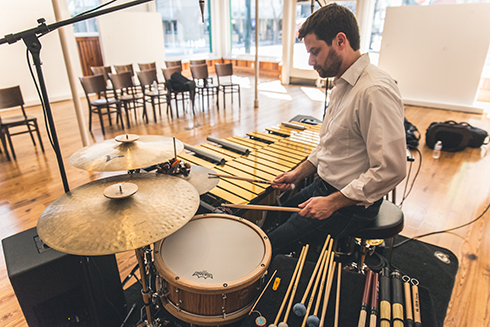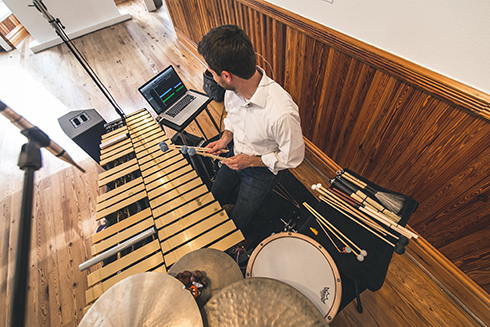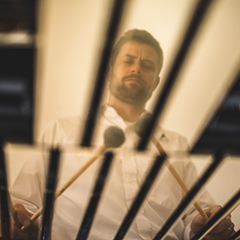by
Rhythm Scene Staff
| Oct 01, 2019

Thad Anderson is Associate Professor and Coordinator of the Percussion Studies program at the University of Central Florida in Orlando. In addition to his duties in the percussion area, he teaches courses in music technology and directs the UCF New Music Ensemble. His currently serves the Percussive Arts Society on the Executive Committee as the organization’s Secretary.
Rhythm!Scene: How did you get started in percussion?
Thad Anderson: Drum set was my first musical instrument. I started studying privately when I was in seventh grade and formed a few bands in the early days. At the encouragement of my mother, I joined my high school band as a sophomore and never looked back. Within the year, I was enrolled in as many music classes as my schedule would allow and committed to pursuing a music degree. It all started with drum set.
R!S: What is your favorite percussion instrument and why?
TA: Growing up, I had so many interests and thought I might pursue a variety of professions—baseball player, firefighter, architect, etc. The percussion world fulfills my instinct to need variety and evolve with my personal interests. One day I can give a solo marimba recital, and the next day I can play drum set with the band I’m in. I truly don’t have a favorite.
R!S: What is your most prized percussion-related souvenir?
TA: The first item that comes to mind is a found instrument. I have a set of spun-steel brake drums from the 1920s. I bought them in Petaluma, California while visiting a specialist who focuses his business on vintage brake parts. These are the style of brake drums that Henry Cowell, John Cage, and Lou Harrison discovered in the junkyards and composed for in the 1930s. They sound very different than the cast-iron variety that we are all familiar with; they sound more like chimes with pure tone than the “clunk” or “pink” of an anvil.

R!S: Who was your percussion idol growing up?
TA: There are far too many to list here. At the moment, I would say that I idolize and have a lot of respect for the generations of percussion teachers who have come before me in the college ranks, particularly those who remain active and involved in their career some 35 or 45 years after they began teaching. There are many who fall into this category, and I strive to follow in their footsteps and continue to perform, commission, teach, record, and give back in the same ways that they are still active in our field.
R!S: What was one of your most memorable performances as a student percussionist?
TA: Performing the world premiere of John Corigliano’s “Symphony No. 3” with maestro Jerry Junkin and the University of Texas Wind Ensemble at Carnegie Hall was certainly a highlight, but I have many fond memories on stage performing with my peers.
R!S: Who were key or memorable teachers in your musical education?
TA: Early in my musical career, a very influential non-percussionist made a significant impact on me as a musician. Rebecca Brown directed a youth choir that I played drum set with through high school. This was my first opportunity to make a difference with music, and it really made a difference in me. I would also include my early teachers growing up in Gainesville, Florida: Paula Thornton and Vicki Nolan, my band directors, as well as Tom Hurst and Ken Broadway. I would be remiss if I didn’t mention my primary college percussion teachers, Jeff Moore, Thomas Burritt, and Tony Edwards; all three continue to make a big impact on me.
 R!S: What sort of music activities are part of your job—performing, teaching, composing, recording, engineering, other?
R!S: What sort of music activities are part of your job—performing, teaching, composing, recording, engineering, other?
TA: I enjoy my role at UCF because I am involved in areas and interests outside of percussion as well. In addition to teaching applied lessons and directing the percussion ensembles, I also teach in the music technology area and direct our New Music Ensemble. Outside of the percussion field, technology, conducting, and contemporary music are some of my biggest passions.
R!S: What was your introduction to PAS?
TA: I joined PAS as a junior in high school in the Fall of 1997. I still remember getting my first issue of Percussive Notes in the mail—it was the preview issue for PASIC in Anaheim, California—and I have a vivid memory of reading it and showing my fellow percussionist in our high school band room. I still have my original PAS number that I got back in 1997.
R!S: What is one thing you wish all student percussionists knew about PAS?
TA: There are so many opportunities to become involved. PAS is much more than an annual international convention; PASIC is pretty incredible, though! I would encourage student percussionists to get involved locally by attending and participating in state-wide and regional events. PAS also offers a lot of scholarship and participation opportunities on an international level. Competitions are also a great way to become active within the organization.
R!S: What’s the first section you read in a new issue of Percussive Notes or Rhythm! Scene?
TA: I still receive the physical copy of Percussive Notes. I wouldn’t say there is a section I flip to immediately when I receive a new issue, but I do enjoy going page by page, working my way through it. I’ve read some great articles in Rhythm! Scene over the years, but I have always enjoyed reading the “People and Places” section ever since Percussive News was around. It’s fun to read about what’s going on around the country and world. The media content in Rhythm! Scene is always a great bonus.
R!S: If you aren’t playing, teaching percussion, working, or volunteering for PAS, what are you doing?
TA: Gardening, reading, running, and spending time with my family. During the summer months, I spend a lot of time outside working on various projects. I like handyman projects and maintaining our home. Living in Florida, we also spend a good amount of time at the beach.
R!S: What music or station is playing when you turn on your car?
TA: That depends on the time of year. NPR, sports radio, podcasts, books-on-tape are typically what I listen to during a semester, because I listen to a lot of music while emailing or working at my desk. Most commonly, I’m tuned in to our local NPR affiliate, WMFE 90.7; they are great about supporting and featuring our local arts scene in Orlando.
R!S: What’s the first app you open on your phone or first program you start on your computer each morning?
TA: I typically read the news on a device at the breakfast table in the morning.
R!S: If you could give your 18-year-old self one piece of musical advice, what would it be?
TA: Take your time. As a younger student and professional, I always felt the need to rush ahead to arrive at or complete the next achievement or goal. Over the past decade, I have learned to slow down, be in the moment, and take my time. Easier said than done, but worth attempting!